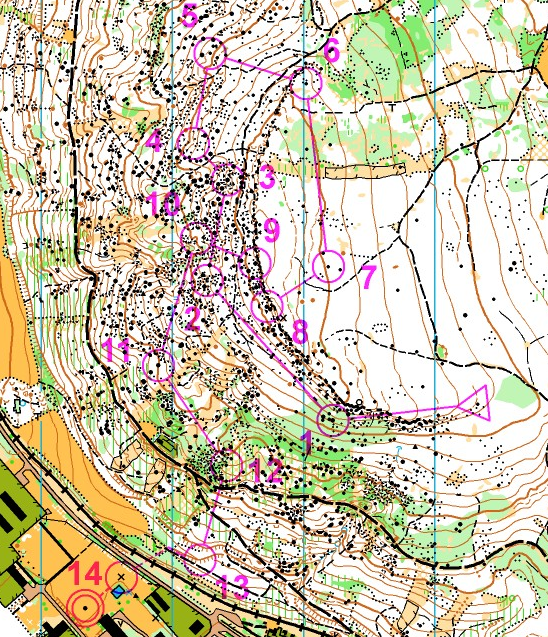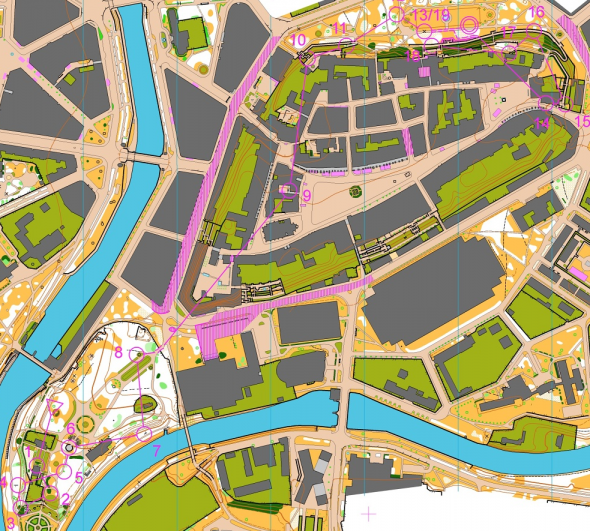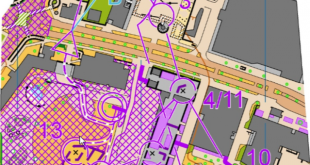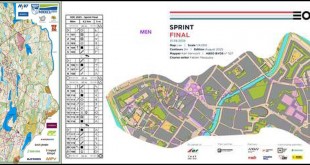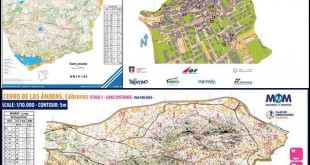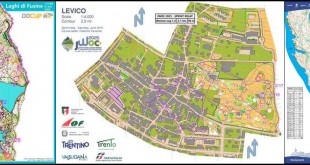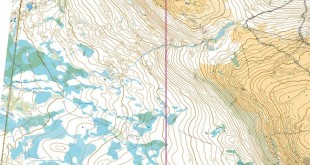– It was with mixed feelings I travelled to JWOC. Unsure of my shape, unsure of how much I would be able to run and unsure of my expectations. I was happy if I could just make it to some of the races – and that wasn’t at all the mood I planned to be in at the start at JWOC.
Miri Thrane Ødum (Denmark) won this years JWOC middle distance in Czech Republic – two weeks after one of her biggest days as an orienteer so far – winning the Jukola relay with Pan Århus. The weeks between Jukola and JWOC were not that rosy, though. Read on to hear Thrane Ødum’s story about the JWOC gold and her preparations.
Focus was on finding one control at the time and just enjoying being on the startline at world champs, because that is really a good feeling
This interview was done by the JWOC 2013 staff just after JWOC – who kindly allowed it to be republished here at World of O. Read on for the complete interview below (with some changes, and addition of maps/links).
Q: How many times did you visit Czech terrains for preparations and what did you consider the most difficult then for JWOC itself? Stony area of middle, continental diverse green of relay, hilly long..?
In March I went to the Czech Republic in the area of Doksy, which wasn’t relevant for JWOC, but it was really nice terrains, sandstones and hills.
A few weeks after this camp, we went to Hradec Kralove, Trutnov and Sumperk, to get a taste of the terrains for JWOC. The Danish team had a camp in May, but that was only for the oldest in the junior group, so I couldn’t come. I’ve studied maps and made courses for the long and middle-distance especially, so when I went on the camp I had a very good idea of how to orienteer in the different terrains.
The terrains in the Czech Republic were difficult in different ways. That was a really good thing about this year’s JWOC. Each distance was demanding in different ways, and the runners had to be good to changing the technique and strategy during the week.
From what I heard the long-distance was a long mental fight. The terrain was fast, nice ground, but really hilly. You had to make good route choices and had to believe that the route you picked was the best, otherwise it would cost you time. It was important to stay positive during the course despite that it was tough as hell.
Illustration: JWOC middle distance course (women).
Middle-distance was technically really challenging and it was hard to keep high speed in the rocky terrain and difficult to read the map at the same time and easy to lose direction downhill. I think in this sort of terrain it is hard to run without mistakes. But when minimizing the mistakes and respecting the terrain it will take you far.
The relay was demanding in another way than the other forest distances. In was very flat, diffuse and green. A lot like Denmark in some parts. There were a lot of tracks, but they were quite squared, so when going around instead of going straight on, it sometimes felt like you were running a lot around.
The sprint was partly park and partly old city. So again there was a switch between techniques. Going fast and keep your head up. In the old city center it was more demanding a lot of stairs and more routechoices.
The two weeks between Jukola and JWOC were quite turbulent. At some point I wasn’t sure if I could manage to get ready in time.
You suffered problems with something in your leg before JWOC. Can you also describe it a little bit more? For how long time already and how did it affect your preparation?
I hit my leg some days before Jukola/Venla (which was on 15/16 June), and I kept running on it the following five days, I ran with pain and I could feel that I didn’t run naturally at all. So my thigh became really overloaded so I could barely walk. The two weeks between Jukola and JWOC were quite turbulent. At some point I wasn’t sure if I could manage to get ready in time. I could only aquajog and bicycle. I got a lot of treatments for my leg. For 10 days after Jukola I didn’t run, but three days before leaving I felt that the leg was good enough to try and go. It was with mixed feelings I travelled to JWOC. Unsure of my shape, unsure of how much I would be able to run and unsure of my expectations. I was happy if I could just make it to some of the races, and that wasn’t at all the mood I planned to be in at the start at JWOC.
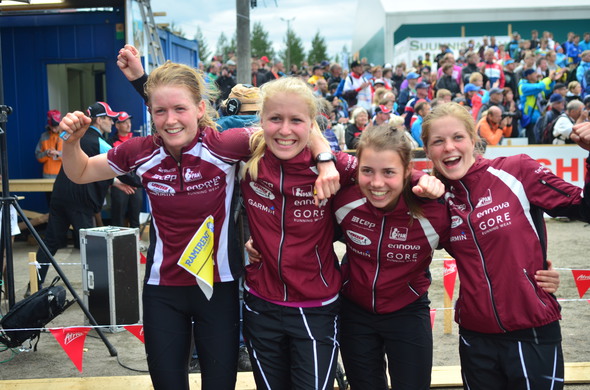
Jukola winners 2013: Pan Århus. Emma Klingenberg, Maja Alm, Miri Thrane Ødum and Ida Bobach.
It affected my preparations in a lot of ways. You don’t lose that much shape in two weeks and I still knew how too orienteer. I had to accept what happened and work with what I got, and that was orienteering. But mentally it affected me a lot. It’s quite bitter when preparing yourself for one very important week for almost a year and then two weeks before its time, some stupid tree is in the way and changes a lot of things. I think I succeeded with trying to focus on the things I could do something about instead of feeling sorry when I couldn’t train as I planned the last weeks, and couldn’t run the long distance. I think this experience made me more relaxed when I afterall was ready at the start to the middle. I really looked forward to orienteer and run in that terrain, and my focus wasn’t on a podium or a medal which it might have been if my preparations had been as I planned. But focus was on finding one control at the time and just enjoying being on the startline at world champs, because that is really a good feeling.
But I knew that if I had my mind on orienteering and minimizing possible mistakes, my chances weren’t smaller than of the others. I knew how demanding it was going to be technically and I respected the terrain. I knew if I gave myself time to orienteer it would be good.
I think I succeeded with trying to focus on the things I could do something about instead of feeling sorry when I couldn’t train as I planned the last weeks, and couldn’t run the long distance.
Q: Was it still quite serious so that you decided not to start at long or you simply knew, that it would get worse again after long and hilly race? Or/and was so that you had to choose either long or middle? In one article I read, that you felt long as your main chance.
My leg was still painfull, so we decided that it would be for the best if I didn’t compete at the long, because it hurt when running on hard ground and we supposed there was going to be a lot of path-running. Also I didn’t feel like the last two weeks were good enough to run a race that demanding physically. It was really a shame because the long was the distance I felt most comfortable with the terrain, it was more Danish. But I had to focus on middle and prepare to perform there. At the model event I had the feeling that when I had a good map with a course I could focus on that instead :). I think it was a choice between long or the rest of the week.
Q: Is there anything more to add to your middle race? You simply run, almost without mistake, just with some 30 seconds loosing at the last control in stony area (12th) – but there, many runners lost some time or medal even. Perhaps your advantage was in speed too, so that you were winner anyway; or every other favourites made more mistakes?
One by one they came in after me. It felt crazy.
I think in that type of terrain it was difficult running without mistakes. But I ran with a lot of control, and safe and managed to minimize the smaller mistakes I did. Most important of all I think I was good at accepting when I missed and not let it interrupt me.
I started making a smaller loop to the first control because I thought I could climb a steep near the control, but when I saw it I thought it would be stupid to twist the ankle to 1st control, so I went a bit back and climbed it somewhere else. I lost about 50 seconds to fastest and 45 to Lisa.
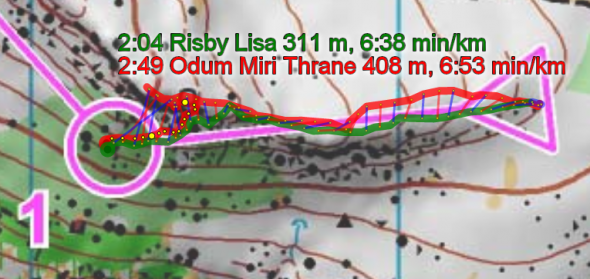
After 4th I hit the flow and my orienteering was good. I stopped at the controls when it was needed, and I pushed hard, when I knew what to do. When I approached the finish I lost focus for a second, so I lost 30 sec. to 12th.
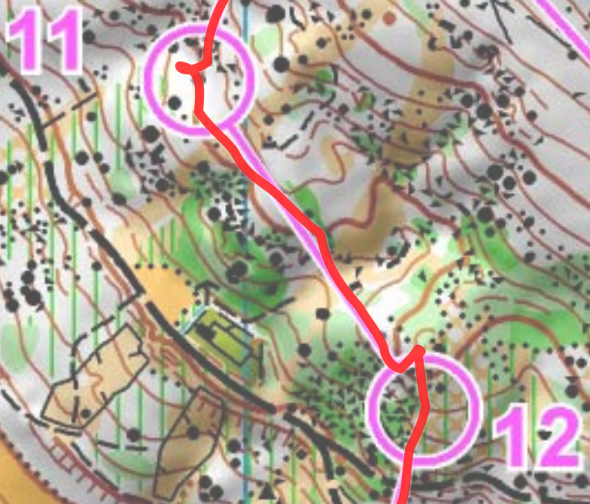
It was great to run into the finish in lead, and I was happy about my performance in the race. I knew there were 13 good runners behind me, all the medalists from long, so I had no idea what it could be. But one by one they came in after me. It felt crazy. The feeling of running a race where I did exactly as I planned to do, succeeding and actually win – I can not compare that feeling with anything. And I really want to feel that again one day.
A lot of the favorites made mistakes as well, and I can see they lost time. I think maybe they went harder than me in some parts, but for me it worked daring to stop and plan.
Q: I believe, your result from sprint doesn’t correspond to your potential – you didn’t run at full speed because of your leg and to stay strong for relay I suppose?
I simply did not feel ready, and I guess I wasn’t
I had prepared most for the long and middle but I really looked forward for the sprint, even though I knew the last two weeks and my preparations wasn’t optimum for sprinting at all. The sprint went wrong because I didn’t take the time to orienteer. I was too worried that my leg would start to hurt when running on hard ground and I feared that it would take my focus away from the map.
And that is exactly what happened. It was a really good course, but one of the worst sprint performances I have ever done, because I simply did not feel ready, and I guess I wasn’t. It is difficult to focus when your leg is hurting already in the warmup, and when the thought that it would be better for the body not to run, it becomes quite difficult to perform.
Q: Relay were quite unhappy for you all. You started even the first within the leading “bus”, but lost almost five minutes and arrived seventh. Simply nerves, as it happens during relay, when you want to recover mistake and make another one instead, even bigger (you spent lot of time at 10th control above all, it looks)? In the end you were fourth, but Ita – guessing from track track and splittimes – even didn’t punch that 12th control in open area at all?
I knew that you don’t win a relay on 1st or 2nd leg, but you lose it. And that’s what I did
Yes relay was really bad for us and not as we hoped. Cecilie ran really strong and good on 1st leg. She changed as first, same time as some other teams. Of course there were nerves when running out In front, but I’ve tried that before and I knew that you don’t win a relay on 1st or 2nd leg, but you lose it. And that’s what I did.
I went quite safe on the routechoices and got the controls good. The green areas were all over the place and it made it really hard to have a safe inlet and it was easy to loose direction. On 10th control I tried going straight on, and I lost 3-4 minutes because I totally lost directions in there. Then I made a smaller mistake before the spectators. I sent out Ita far behind, and sadly she mispunched in the ending if her leg.
Q: Where there some non-medal runners, from whom you expected, that they should take some medal?
It is difficult to say. There were a lot of good runners both in men’s and women’s class which could have taken a medal. But it is hard to say what is needed to win on the day. To mention one, I thought maybe Isia Basset from France could have taken one, she was close on all the distances, podium both long and middle.
But on the other hand I was surprised and impressed of some of the smaller orienteering nations. Tim Robertson won bronze on sprint, and Anastasia Denisova from Belarus, got bronze as well. That was very cool of both of them.
Q: How did you like the atmosphere at JWOC?
I think it was good the banquet was held afterall! That is a good way to end a very good week
The atmosphere at JWOC is really good. It’s fun and interesting to meet all the other nations and runners and everyone is having a good time I think.
It was a really well arranged JWOC. The organizers all the time had the runners best in mind, for example the opening ceremony was held inside sitting the day before long. It was very clear that a lot of work and energy was put into maps and courses, it was so good. Everything with spectators, TV, tracking, speaking was really good and not compromising with the runners best and the important things such as maps and courses.
And I think it was good the banquet was held afterall! That is a good way to end a very good week.
Q: Did you feel it just as advantage or were you a little bit sorry that you didn’t sleep in the same hotel as most of the runners?
It was fun living with the Swedes although of course it’s a shame not living with all the other nations. The JWOC-week is always quite hectic and intense so when we lived so far from the others it was hard to talk to them during the week. Meeting all the other runners is a big part of JWOC as well.
Q: Well and also a little bit apart from JWOC. Living in Birkerød, studying in Hillerød, which both is east of Denmark, member of Pan Århus, west of Denmark. Where do you usually train? :-)
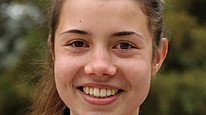 I live home in Birkerød so that’s where I do most of the training. In Denmark many of the clubs work together, because Denmark is quite small. There is a big training group with almost all runners age 14-20 from Sealand (the part of Denmark where I live – the island on which Copenhagen is located too) and the same kind of group in the other regions in Denmark, this works really well.
I live home in Birkerød so that’s where I do most of the training. In Denmark many of the clubs work together, because Denmark is quite small. There is a big training group with almost all runners age 14-20 from Sealand (the part of Denmark where I live – the island on which Copenhagen is located too) and the same kind of group in the other regions in Denmark, this works really well.
In the school I am going to and the elementary school just next to there two trainings a week in the morning are arranged. We are a lot from the junior team and a lot just outside the team who live within 20 minutes so there is always someone to train with and that’s quite a gift. But I train a lot by myself too and I really like that.
I go to Århus for a day or a weekend now and then. Mostly ahead of the big relays.
Q: Not just towards JWOC, you perhaps need to train in different terrains than just Danish to be successful on international scene, how often in a year do you manage to go training abroad for longer time?
Next year I’ll move to Sweden permanently
Yes. I think (especially) as Dane it is extremely important to search for challenges in other terrains to expand your technique. We are quite lucky that Sweden and Norway is quite close. It’s easy to go to competitions and training weekends over there, and then the continental terrain is here. I’m in high school now so it’s sometimes difficult to go abroad for a longer time. In the spring I was in Sweden 4-5 times in a row for the weekends. Next year I’ll move to Sweden permanently. My opinion is that as a Dane you have to get to other terrains than Danish for a longer time to become really good. Every year in February and March we have two camps more south. This year it was Portugal in winter and Czech Rep. in the Easter. In the fall I think we’re going to France and perhaps Bulgaria.
Q: It is worth to introduce your brother, Marius Thrane Ødum. He achieved four medals from three JWOCs, two of them last year in Slovakia, including silver from long, his only individual metal. This year, he had good chance to run WOC already, but, if I am not wrong, disease disabled it him. Have you started orienteering together or did one of you follow the other one later? Or are you entirely an orienteering family, parents including, which also happens quite often?
Marius got Borelia some weeks before WOC, it was really a shame, because he looked forward for his first WOC and I think the terrain would have suited him well. We are an entirely orienteering family. My parents were in the national team maaaaany years ago, and my younger brother orienteers too in addition to football. Marius and I have always been “dragged” along to orienteering since we were very young, and now it’s almost the opposite. I think I maybe followed Marius a bit, when being the younger. When he started to do well, I wanted it too.
Q: How did you enjoy the JWOC 2010, which was organised in Danmark?
I enjoyed JWOC 2010 from the sideline. It was a very warm week. It was fun experiencing a homeground championship. As In Czech this year it was really fun seeing all the Czech spectators going crazy when both men and women won the relay, fantastic. It was quite the same in Denmark with the spectators at the relay when the girls got gold and boys got bronze. I don’t know how it was for the runners. But it was technically in the sand dunes and different from distance to distance as this year.
Q: Already in 2012, you run 1st leg of Pan Arhus team at Venla, which achieved bronze medal, and this year …. you were winners even. This must be big motivation for further training. How did you feel in such a hunt alongside many elite runners? Was it your first start at Venla/Tiomila?
Our victory this year was really crazy to be a part of, it’s so much fun succeeding with a team and against all these best clubs
It’s an incredible motivation running in a team with some of the best runners and I learn from it each time. I feel fortunate that I have had the opportunity already. I really enjoy running in a team where it is expected from me to perform and I’ve learned a lot about how to handle this pressure and orienteer at a relay, both I can use on my individual performances as well. Last year Venla was my first time running in Finland. It was so cool starting with 1200 women behind me, and I really enjoy running these big relays because it’s one of the only times us juniors can compete against the best seniors. It was so fun this year, when I ran 2nd leg, looking around and see Jurenikova, Brozkova, Venla Niemi and so on.
Last year, when we were 3rd, was so huge for all of us. The project In Pan had only been on for half a year so it was an incredible for us. This year it was a bit different, because we could feel the expectations to us and we had expectations on our own too. Our victory this year was really crazy to be a part of, it’s so much fun succeeding with a team and against all these best clubs.
Q: I suppose your further plans are quite clear. You can run JWOC 2014 and 2015 even, so to achieve best possible results there. Is there anything in particular, in what you should get improved (such speed, mental training and so…)?
There are so many things I would like to improve! But it’s about starting with the things that will improve the performance the most. First of all I think it’s important to get free of injuries and illness so I can train undisturbed for long time.
Mentally I would like to become better to find that mood I have to be in before competitions. Then to know how to deal with distractions in the forest and stay focused on what I’m doing.
As always it is important to work with the physics, so I will keep on doing that. I would like to become stronger in hills.
Technically there are so many details I would improve. I think during the winter I will improve my basic skills, because that’s important in all terrains. Then I would like to work with the control picking, that’s often where I do mistakes, and then of course, knowing when to slow down at the right time in forest(!).
I think next year in Bulgaria in July it can be really hot, but that can be difficult to train in Denmark. I have to figure something out…
Q: What’s your personal best on 3 (5) km at athletic track? Does the personal best have some significance in selection for JWOC/WOC?
Personals best on track doesn’t have anything to say for the selection in JWOC or WOC. It’s about being fast in the forest with a map in your hand. But of course it is a force to have high speed on flat ground.
My PB on 3000m is 10.46 set in September 2011 and 5000m is 18.49 (but that was in a city race) set in June 2010. So both records is some years ago, I suppose or hope to be faster now! ;)
Q: When do you suppose that you might get qualified for WOC or at least some World Cup race?
Mmh. I don’t know. I would like to do it soon. I think it would be great to experience the orienteering in senior level. It was quite a step going from EYOC to JWOC. And I’m sure it’s even more difficult going from JWOC to WOC.
Maybe I could come in one or two years while I’m still junior, but that’s nothing I expect before I’m senior. Some of the other Danish girls have, so you never know. There is much smaller elite group In Denmark than in Sweden for example, so it’s easier to get these experiences in early age here. Right now I have two more junior years left, and I am really looking forward for what’s going to happen.
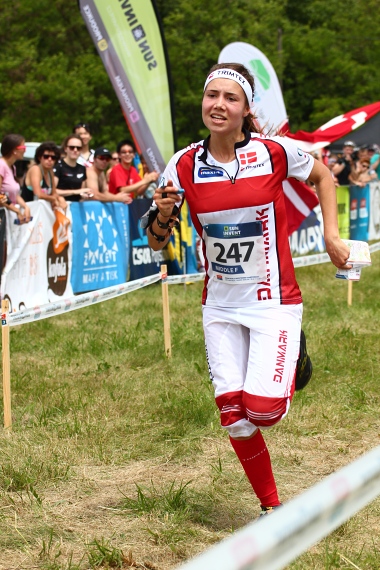
Photo: Miri Thrane Ødum running towards gold at JWOC 2013 middle distance. Photo (C) JWOC 2013.
Q: This year, you still can run EYOC, I suppose you will make effort to qualify there? Last year you couldn’t run just because of the date being almost the same as for JWOC?
Denmark only sends M-W16 to EYOC. But it would really be a lot of fun in Portugal I think. I will be at JEC in France in the fall.
Q: “At blive verdens bedste” – “To become the world’s best”, this is what you have written as your dream at your personal profile at Danish O website. Did you mean it towards JWOC2013 or in general and therefore you still have your dream in front of you?
I think working for something is the greatest journey. The process of trying to succeed is tough, but so fun.
That will always be THE DREAM. I’m not at all set yet. I think working for something is the greatest journey. The process of trying to succeed is tough, but so fun. And all the work is worth even though you don’t succeed the day you had in mind. There is always another race.
I was the best that day, but World champion isn’t something you are. It’s something you have been and you can be again. And I will work really hard to do it again, because that day and that feeling was the greatest feeling I’ve ever felt. The ultimate for me is to achieve a gold medal in seniors, so hopefully one day in the future…
Well, so thank you, good luck with your dream and let it come true!
Interview by Petr Kadeřávek – you find the original interview here.
 World of O News
World of O News
